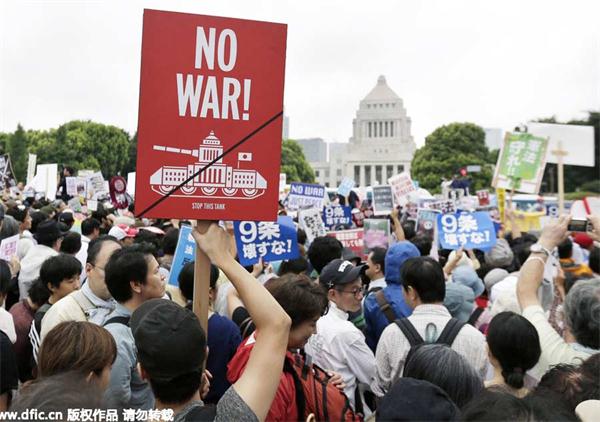 |
|
Demonstrators protest against the controversial security bills outside the parliament in Tokyo, Japan, August 30, 2015. [Photo/IC] |
Just four days after China’s Sept 3 Victory Day parade, Japan complained again about the grand commemoration it deliberately skipped. Japan’s top government spokesman, Yoshihide Suga, accused UN Secretary-General Ban Ki-moon of “playing a verbal game”, seeing his attendance at the Beijing-based events as a betrayal to the world body’s “neutrality”.
China on the same day urged Japan “to stop being ridiculous” over its complaints about Ban, who made it clear earlier that the UN is an “impartial” body rather than a “neutral” one.
This was not the first time Tokyo sought to challenge the UN chief, who was urged to “take a neutral position on events that focus mostly on the past”, before he arrived in Beijing. It even went further to criticize China on the very day it held the national commemoration, saying the country “should show its intention to tackle common issues facing the international community with a view to the future”.
In essence, the deep grudge that Japan holds against Ban has a lot to do with its failure to break free of the infamous past. Such a groundless retort may sound extremely repugnant in the ears of Japan’s wartime victims like China, especially when the world is celebrating the 70th anniversary of victory in World War II.
It is universally acknowledged that Tokyo never liked its tag as a “defeated nation” during following WWII, and has tirelessly sought to remove it for good. To prevent former fascist powers, including Japan and Germany, from reliving their militaristic past, the UN Charter imposed explicit restrictions on them. But for Japan, which has longed for a permanent seat on the UN Security Council, these restrictions are indeed a mountain to climb, and cannot be invalidated unless the country faces up to the tremendous sufferings it inflicted on the Asian community.
On the one hand, Tokyo may feel all their “contributions” to the UN’s global deployment - such as the peacekeeping operations - are just a fool’s errand, because Ban showed up at the events marking its surrender in 1945. That explains why the Japanese government repeatedly made short-sighted comments, in a bid to vent its anger towards the fact that it might never get rid of the “defeated one” tag.
On the other, challenging the UN’s impartiality on China’s WWII celebrations is in line with the Japanese right-wingers - including the Prime Minister Shinzo Abe - who have been bent on denying, even beautifying, Japan’s colonial aggression. In their eyes, Japan has neither committed aggression nor imposed hellish rule on any country. The UN chief’s attendance at China’s V-Day events, which are designed to celebrate victory in the Chinese People's War of Resistance against Japanese Aggression (1937-45), is the last thing they want to see.
Besides, as a traditional major economy in Asia, Japan has failed to hide its jealousy as China is becoming a confident global player, that has just presented the world a spectacular celebration. Five years ago, China replaced Japan as the world’s second largest economy, disappointing some Japanese politicians who were firmly under the belief that their country is the second-to-none Asian leader.
However, it is Tokyo that should be aware of how far it has gone in whitewashing its wartime atrocities and challenging the international justice that Ban delivered in Beijing. Worse still, since taking office in 2012, Abe has made several notable attempts - such as revising the pacifist Constitution - to lift the ban on Japan’s right to collective self-defense and enlarge its military muscles. Dangerous moves like that will get Japan nowhere, should it truly want to be a permanent member of UN Security Council and reassure all peace-lovers across the globe.
The author is an associate researcher at the Japan Studies Center of the Chinese Academy of Social Sciences.

I’ve lived in China for quite a considerable time including my graduate school years, travelled and worked in a few cities and still choose my destination taking into consideration the density of smog or PM2.5 particulate matter in the region.